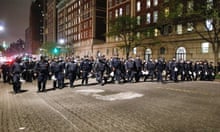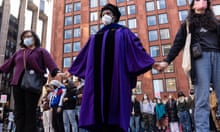Benjamin Netanyahu is due to arrive in Washington on Monday at a moment of historic political tumult, as he is scheduled to meet the outgoing US president, Joe Biden, and address a divided Congress amid fears of a growing regional war in the Middle East.
The Israeli prime minister’s arrival will come just a day after Biden bowed out of the presidential race, and will be a major test of Biden’s ability to project US influence and restraint on Israel in the lame duck period of his presidency. Netanyahu will be forced to walk a tightrope as he balances between the Donald Trump-led Republican party and a reinvigorated Democratic campaign that may unite behind the vice-president, Kamala Harris.
Speaking to reporters from the tarmac at Ben Gurion airport in Israel, Netanyahu said he was due in the US as “Israel is fighting on seven fronts and when there’s great political uncertainty in Washington”.
He added: “I will seek to anchor the bipartisan support that is so important for Israel.”
Netanyahu is expected to meet Biden, and Harris, as he is under pressure from the highest echelons of the Israeli military and much of the Israeli public to agree to a ceasefire in Gaza. He is scheduled to address a joint session of Congress on Wednesday, where he has been invited by the House speaker, Mike Johnson.
The two leaders have a strained relationship and Netanyahu had been seen as waiting out the Biden administration in favour of a second Trump term. But Biden’s exit from the campaign creates new uncertainty for the elections, and could embolden him during talks with Netanyahu, according to analysts and insiders in Washington.
“I actually think the announcement puts him in a stronger position, because the likelihood of continuity of policy into a Democratic administration is more likely now,” said Kori Schake, the director of foreign and defence policy studies at the American Enterprise Institute.
But while the Israeli premier’s arrival in Washington could smooth the path to a ceasefire deal, his critics fear Netanyahu will use the visit to seek backing for continuing and possibly even expanding the fighting in what has become Israel’s longest war.
“Netanyahu wants to speak in the US above the heads of Congress and way past Joe Biden to Donald Trump, who in the past called Netanyahu a weak leader,” said Gershon Baskin, a former Israeli hostage negotiator. The Israeli leader will transmit messages of support to Trump, anticipating his potential return to the White House, looking for ways to sustain Israeli military action in Gaza in return, said Baskin.
A senior European diplomat said expectations of a ceasefire being concluded were limited. “His own political life is tied up in this war in Gaza,” said the diplomat. “I think in that sense some sort of conflict has to keep going.”

Netanyahu’s office released photographs of him onboard the government-owned jet shortly after his departure, seated next to a blue hat embroidered with the words “total victory”.
Some of those taken captive by Hamas militants in Gaza and freed during a previous hostage deal are expected to travel with Netanyahu to Washington. Their decision to do so has proved controversial to relatives of some of the 116 hostages believed to be still in Gaza, who last week called on the former hostage Noa Argamani not to fly with Netanyahu “as decoration”.
The Israeli leader has claimed that only military pressure will free the remaining hostages, while 70% of Israelis believe Netanyahu is responsible for failing to secure a deal, according to a poll released the night before his departure to Washington.
Israeli protesters and even military chiefs are calling for a deal with Hamas, which would free hostages in exchange for a pause in fighting. Negotiators from Israel’s the Mossad intelligence service are expected in Qatar later this week, continuing talks that have dragged since early this year.
Shortly after Netanyahu’s departure, the Israeli military announced that two of the hostages held by Hamas were killed in recent months, saying they were investigating the cause of death including the possibility that at least one was killed by Israeli airstrikes on Gaza.
A 17-year-old former hostage wrote on social media about 35-year-old Yagev Buchshtab, whom she described meeting briefly during their time in Hamas captivity. “The state could have saved him,” she wrote.
A ceasefire deal in Gaza could also cool tensions across the region, after a drone sent by Yemen’s Houthi militants struck Tel Aviv late last week. Israeli forces responded with airstrikes on the Yemeni port of Hodeidah.
American mediators are also working to prevent increasing fighting between Israeli forces and Lebanon’s Hezbollah militia, who have fired rockets and drones into northern Israel, while Israeli forces have responded with a barrage of attacks on Lebanese territory.
The Houthis and Hezbollah have said they would end their attacks if Israeli forces stop military action in Gaza and allow more humanitarian aid to enter. More than 39,000 people have been killed by a fierce Israeli assault on the territory, amid widespread criticism of the Biden administration for supplying Israel with weapons.
Despite assurances from US officials that a deal is within reach, those with close knowledge of the negotiations have remained doubtful, accusing Netanyahu of blocking a deal before his visit to Washington and possibly in the longer term.
“From the ground, it doesn’t look like we’re on our way to a ceasefire,” said Nadav Weiman, the deputy head of Breaking the Silence, an organisation of former Israeli soldiers critical of the state.
“It doesn’t look like our prime minister wants a ceasefire or a hostage deal, because more than anything else he cares about himself, and avoiding trial. For that he needs his rightwing coalition. He’s coming to Congress for Benjamin Netanyahu, to see his best friend Trump, he wants an audience with him more than Biden I think.”
Netanyahu’s visit comes days after the international court of justice ruled that Israel’s occupation of the West Bank was illegal and that it should halt settlement construction immediately.
The chief prosecutor of the international criminal court, Karim Khan, applied in May for arrest warrants for Netanyahu and the Israeli defence minister, Yoav Gallant, accusing them of committing war crimes and crimes against humanity in Gaza.








